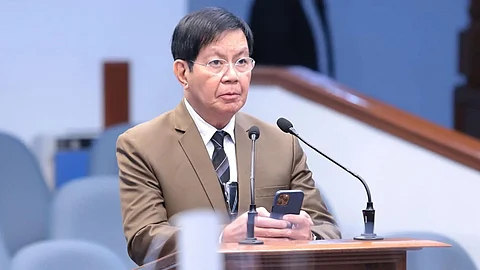
- NEWS
- the EDIT
- COMMENTARY
- BUSINESS
- LIFE
- SHOW
- ACTION
- GLOBAL GOALS
- SNAPS
- DYARYO TIRADA
- MORE

While not necessarily illegal nor evil, Senate President Pro Tempore Panfilo "Ping" Lacson said that budget insertions are often abused by lawmakers.
In a radio interview, Lacson reiterated his call for transparency and accountability from lawmakers in the deliberations for the 2026 budget.
"Introducing insertions is not illegal. It is our mandate as lawmakers to review the National Expenditure Program and introduce amendments. The problem is that many lawmakers abused this mandate," Lacson said in a mix of English and Filipino.
"I hope that in 2026, we will practice self-restraint. The people are angry, so we must reform the way we pass the budget," he added.
Lacson said the insertions—more than P100 billion by the Senate alone—were for the budget of the Department of Public Works and Highways (DPWH) only, to implement infrastructure projects, including flood control projects.
He noted that the document listing the House members who made insertions for the DPWH included several pages, with the names in alphabetical order.
"It was like a roll call," he said of the House list. Meanwhile, when asked if the amount exceeded the insertions made by the Senate, Lacson replied: "Much, much more."
Lacson said the DPWH received such massive insertions because many lawmakers were likely in collusion with corrupt DPWH officials to carve out huge kickbacks from projects—even if it meant giving the DPWH a bigger budget than the education sector, in violation of the 1987 Constitution.
"The system of corruption has been in place, with lawmakers dealing with the district engineer and former Undersecretary Roberto Bernardo," he said.
"That's the pattern. You see the DPWH getting a bigger budget than the education sector because everyone involved got greedier and greedier, and stuffed the DPWH's budget. That is unacceptable," he added.
Lacson furthered that while it is good that a huge part of the insertions were held and tagged "For Later Release," this may affect the economy because properly vetted projects may not get the funding they need.
He said the Senate must lead the way in ensuring transparency in budget deliberations, especially during the period of individual amendments in plenary.
"That is the reason why we need to be totally transparent in the budget deliberations of the 2026 budget measure, especially during the period of individual amendments in plenary," he added.
"The Senate must lead the way in this regard, at least by revealing the identities of the proponents of such individual amendments."
